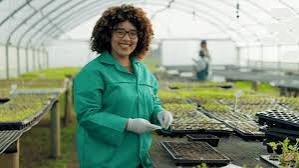Plant Production Learnership : SETA FUNDED

Plant Production Learnership: Your Comprehensive Guide to Starting a Career in Plant Manufacturing
Plant Production Learnership plays a vital role in farming and manufacturing. It helps ensure there is enough food and raw materials for everyday life. As agriculture grows, so does the need for skilled workers. If you’re interested in working with plants, a learnership in plant production could be your perfect start. It offers practical experience and opens doors to many job opportunities.
What is a Plant Production Learnership?
Definition and Overview
A plant production learnership is a training program that combines classroom lessons with hands-on work. It’s designed to teach you everything from crop care to machinery use. Unlike an internship, a learnership offers an official qualification you can add to your resume. It’s focused on helping you develop skills that employers look for in the plant industry.

Purpose and Benefits
Learnerships are made to help newcomers gain real skills while earning a certification. They bridge the gap between school and work, making you more job-ready. Completing a program can boost your career fast. You’ll get industry-specific knowledge and practical experience that can set you apart.
Who Can Apply FOR Plant Production Learnership
This opportunity is for students, recent grads, or anyone thinking of switching careers. No matter your background, as long as you’re willing to learn, you can apply. Basic requirements often include a high school diploma or a related background. Some programs might ask for prior knowledge of agriculture or machinery.
The Structure of a Plant Production Learnership Program
Program Duration and Format
Most learnerships last from one to three years. During this time, you split your days between classroom lessons and real work at farms or factories. You might spend part of the week studying theories and part of it operating equipment or managing plants. This mix gives you a balanced learning experience.
Key Learning Components
- Technical Skills: Learning how to manage crops, control pests, and operate farm machinery.
- Soft Skills: Building teamwork, understanding safety, and solving problems on the spot.
These skills help you handle diverse tasks confidently, preparing you for various roles in plant production.
Certification and Qualification
At the end of the program, you’ll receive an industry-recognized certificate. This qualification proves you have what it takes to succeed. It often aligns with national standards, making your skills valid across different workplaces. Some programs are accredited by agricultural bodies, adding extra value. Plant Production Learnership
Core Skills and Knowledge Gained
Agricultural Science and Plant Biology
You’ll learn how plants grow and what they need to thrive. Understanding genetics, soil health, and how plants respond to different conditions is key. This knowledge helps promote sustainable farming practices that protect the environment.
Machinery and Equipment Handling
Running planting machines, harvesters, and maintenance tools is part of the job. Learning safety protocols ensures you stay safe when working with large or dangerous equipment. Efficiency comes from knowing how to operate machinery properly.
Quality Control and Compliance
Growing plants isn’t just about planting seeds. You’ll also learn to follow rules on pesticide use and environmental laws. Keeping quality high and staying within the rules is essential for success in this field.
Opportunities and Career Pathways Post-Learnership
Entry-Level Positions
The moment you finish, you could work as a crop technician, machinery operator, or quality control assistant. These roles give you real work experience and help build your career.
Advanced Career Progression
With more experience, you can climb to supervisor, farm manager, or technical specialist roles. Your skills and certifications open many doors into leadership positions. Plant Production Learnership
Further Education and Specializations
You can choose to deepen your knowledge by studying agronomy, horticulture, or sustainable farming. Certifications in integrated pest management (IPM) or machinery operation can boost your chances of getting better jobs.
How to Apply for a Plant Production Learnership
Finding Opportunities
Look for programs through industry groups, government agencies, or online job portals. Many farms and factories list openings regularly. Plant Production Learnership
Tips for a Successful Application
Create a clear resume that highlights your skills and interest. Write a good cover letter explaining why you want the job. Prepare well for interviews and practical tests to show your enthusiasm. Plant Production Learnership
Networking and Mentorship
Connect with industry professionals through events or social media. Mentors can guide your growth and help you find new opportunities. Building relationships makes your career journey easier. Plant Production Learnership
Industry Insights and Expert Perspectives
Many leading agricultural educators stress the importance of hands-on training. They say learnerships prepare you for real-world challenges. Industry trends show a move toward sustainable farming and eco-friendly practices, which means ongoing training is more important than ever. Staying updated helps maintain a competitive edge. Plant Production Learnership
Conclusion
A plant production learnership can be your gateway to a rewarding career. It offers the perfect blend of practical skills and industry recognition. If you want to work outdoors, help grow food, or manage farms, this is your chance. Start exploring opportunities today and take that first step toward a bright future in plant manufacturing. Your hands-on journey begins now! Plant Production Learnership




